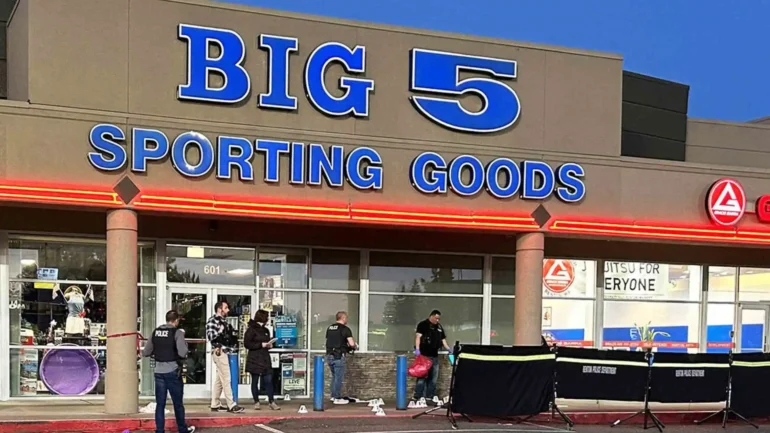Aaron Brown Myers, 51, from Washington, is accused of second-degree murder for shooting 17-year-old Hazrat Ali Rohani on June 5, 2024, outside a Big 5 Sporting Goods in Renton.
Myers, who works as a security guard and thought the teens were trying to rob the store, shot Rohani after mistaking their airsoft guns for real guns.
Video evidence shows Myers was aggressive before the shooting. He has a history of wrongly identifying threats, including a case in 2022 where he chased an unarmed person. Myers is now waiting for his trial after being released on $2 million bail.
What Happened?
Aaron Brown Myers was thinking that the teenagers were involved in a robbery, and confronted them with a gun.
Despite their efforts to explain they were returning an airsoft gun, Myers became aggressive, pushing one of the teenagers to the ground and threatening him with his weapon.
Surveillance video shows that the teenager, Hazrat Ali Rohani, who was unarmed, tried to back away, but Myers shot him seven times, including shots to the back as he ran away.
Aaron Brown Myers claimed he was acting in self-defense, fearing for his safety and the safety of others, but it appears he misunderstood the situation, resulting in a tragic outcome.
The Role of Surveillance Footage
Reviewing the security camera videos from the shooting on June 5, 2024, shows clear differences between what Aaron Brown Myers said happened and what actually occurred.
The videos show Aaron Brown Myers with a gun, making the situation worse instead of calming it down, as he said.
The prosecution points out that the video clearly shows Rohani trying to run away and not grabbing a weapon, even though Myers said he shot Rohani in self-defense.
This evidence weakens Aaron Brown Myers’ claim of being scared for his life, suggesting his actions were careless and unnecessary, which led to the death of an unarmed teenager.
Legal Charges Against Myers
Aaron Brown Myers is accused of second-degree murder, which is a serious crime involving killing someone on purpose or causing death due to extreme carelessness without planning.
It’s less severe than first-degree murder, which needs planning, but more serious than manslaughter.
The exact details of second-degree murder can change by location but usually include wanting to kill or seriously hurt someone, known as malice aforethought.
In some places, if a death happens while committing a crime, it’s also considered second-degree murder.
The punishment for second-degree murder can be up to life in prison or 15 years, depending on the law.
Aaron Brown Myers’ lawyers say he was trying to protect himself and others, while the prosecution believes his actions were reckless and unnecessary, leading to the death of Hazrat Ali Rohani.
Previous Incidents Involving Myers
Aaron Brown Myers has a history of run-ins with the police that could affect his current situation.
In March 2022, he called 911 thinking he saw someone with a gun on a bike and said he might have to use his own gun to stop them.
The police came fast and found out the person was just riding a bike with a part that looked like a gun.
This shows he often thinks things are more dangerous than they are, which could be used against him in his trial for the death of Hazrat Ali Rohani.
Defense Arguments
Aaron Brown Myers says he was trying to protect himself and others from a possible armed robbery by teenagers, showing his fear of a threat.
His defense used 36 testimonials from friends, family, neighbors, and professionals like a city council member and a diplomat, all agreeing he cared about safety and the community.
However, the prosecution believes Myers’ violent actions made the situation worse and caused Hazrat Ali Rohani’s death.
Prosecution’s Case
The case against Aaron Brown Myers focuses on his reckless and unjustified actions when he shot 17-year-old Hazrat Ali Rohani.
The prosecution argues that Myers acted out of fear of a potential armed robbery in the parking lot of a store, despite the teenagers being unarmed and trying to leave.
The key evidence is the surveillance footage, which shows Myers drawing his gun and escalating the situation instead of calming it down.
Testimonies from the teens who survived also show they were carrying airsoft guns, contradicting Myers’ claim of an immediate threat.
This evidence points to Myers’ habit of misjudging threats, raising doubts about his intentions and behavior.
The incident of Hazrat Ali Rohani being shot by Aaron Brown Myers has deeply affected the community and made people think about how force is used, what security staff should do, and how to better train and set rules to avoid such tragedies.

